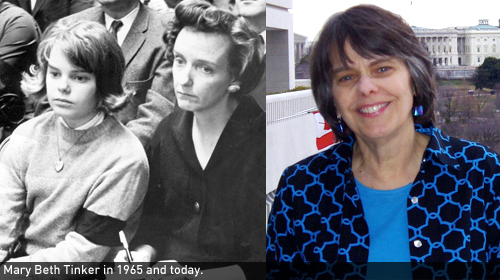
I have zero tolerance for schools that punish students for exercising their First Amendment rights. Students like Wesley Teague, who joked about his school’s athletic department and Kyron Birdine, who was suspended for mocking standardized tests, did nothing more than exercise their right to freedom of expression. Free speech is a right that students need to understand, expect, and use responsibly. Because expressing yourself isn’t always the popular thing to do, I’m going on a “Tinker Tour” to encourage students to know the First Amendment and to hear how they’re using it in their lives.
In 1965, I was the 13 year old who, along with a group of students including my brother John and our friend Chris Eckhardt, was suspended for wearing black armbands to a Des Moines, Iowa school to mourn the dead in Vietnam. For that, we faced harassment and even death threats.
The ACLU came to our defense, winning a landmark Supreme Court decision in Tinker v Des Moines (1969). Justice Abe Fortas, writing for the majority, declared that neither teachers nor students “shed their constitutional rights…at the schoolhouse gate. …In our system, state-operated schools may not be enclaves of totalitarianism….students are ‘persons’ under our constitution.”
That’s why, this Constitution Day on September 17, I will celebrate students’ rights by launching the Tinker Tour from the National Constitution Center in Philadelphia. With the support of the ACLU and others, I will travel the country, talking about our case, the First Amendment, and the natural relationship between kids and the Constitution. To speak on the importance of a free press, Mike Hiestand, of the Student Press Law Center, will join me on the tour.
I am concerned about what seems to be a growing tendency to discipline students who exercise their First Amendment rights. Coupled with a decline in civics education, this tendency endangers our democracy and our future, because we need the voices of young people. To many of us, including the ACLU, it is important that young people know they have the right to express themselves.
Recently, at American University’s Marshall-Brennan Constitutional Literacy Program, Brian Sturgis of Paul Robeson High School in Chicago was honored for speaking up against school closings. Claire Parker from Wilson High School in Washington, D.C. was honored for helping start a newspaper at a local middle school. These are students making a difference by exercising their rights. And while many recognize that kids are the future, we can’t forget that they’re the present, too!
Learn more about free speech and other civil liberty issues: Sign up for breaking news alerts, follow us on Twitter, and like us on Facebook.


